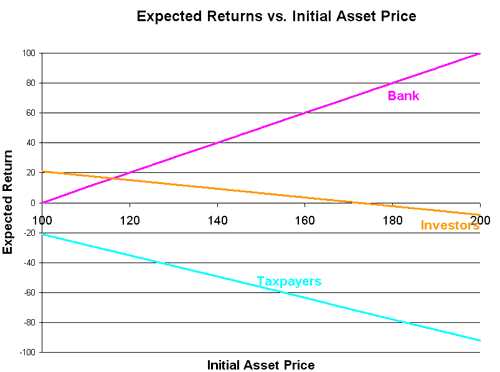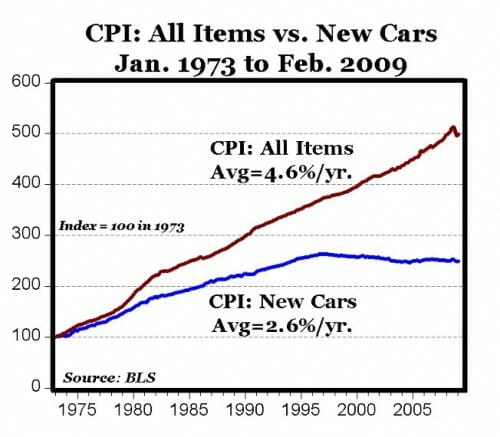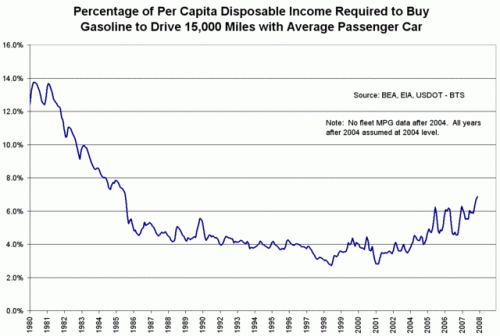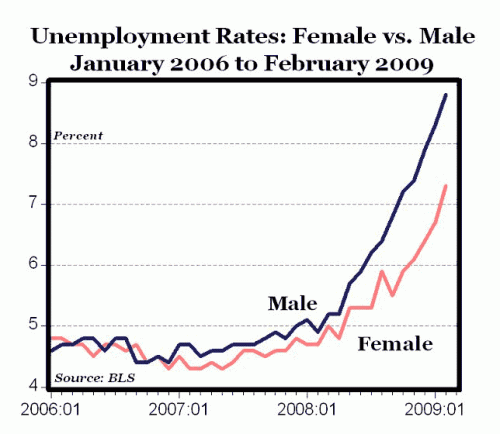This is an update to these two posts on the Geithner toxic asset / bank bailout plan. In those posts, we looked at a hypothetical investment with a 50/50 chance of being worth 0 or 200. From this, we said that the expected value was 100, and looked at payout scenarios under the Geithner plan.
A number of folks wrote me that I had missed part of the point of the Geithner plan. The original assumption of the plan was that the banking system is in a liquidity crisis, and fire sales of assets are reducing the pricing of such assets well below their expected hold-to-maturity value. According to the Treasury white paper:
Troubled real estate-related assets, comprised of legacy loans and securities, are at the center of the problems currently impacting the U.S. financial system...The resulting need to reduce risk triggered a wide-scale deleveraging in these markets and led to fire sales. While fundamentals have surely deteriorated over the past 18-24 months, there is evidence that current prices for some legacy assets embed substantial liquidity discounts...This program should facilitate price discovery and should help, over time, to reduce the excessive liquidity discounts embedded in current legacy asset prices.
Their point is, in our example, that the asset worth 100 is only trading at, say, 50 due to a liquidity discount and the point of the plan is to make this discount go away.
This does make it clearer to me how these guys are justifying this program. If we look at the program on the original analysis, based on expected values of assets held to maturity, we got this profile of returns:

The bank returns in the analysis were based on the alternative of hold to maturity. It is all a zero-sum game - gains at the banks and investors come directly out the the taxpayer's pocket.
If, however, one assumes the asset is trading below expected value, say at 50, due to a liquidity discount, then Geithner can argue the banks get a higher return for the same taxpayer subsidy IF the returns are based on a base case of selling out at the fire-sale market price.

In this case, with these assumptions, we get some "free value" or a multiplier effect of the taxpayer subsidy equal to the liquidity discount.
Is this a valid way of looking at it? Well, the first problem is that this seems like an awful lot of money to spend of taxpayer money just to eliminate a fleeting (in the grand scheme of things) liquidity discount. Banks have a zero-subsidy alternative to achieving the same end, which is simply to hold the investments to maturity, or until the market eliminates the liquidity discount. Those of you who own a home know that you are going to take a hit on value if you have to sell now, while the market is a flooded with homes for sale, vs. two or three years from now. Anybody proposed lately to bail ordinary folks out of this liquidity discount?
But perhaps the more telling criticism of Geithner's assumptions come from a recent paper by a group of Harvard Business School and Princeton professors who have looked at the current market pricing of these toxic assets, and have found little or no liquidity discount.
"The analysis of this paper suggests that recent credit market prices are actually highly consistent with fundamentals. A structural framework confirms that bonds and credit derivatives should have experienced a significant repricing in 2008 as the economic outlook darkened and volatility increased. The analysis also confirms that severe mispricing existed in the structured credit tranches prior to the crisis and that a large part of the dramatic rise in spreads has been the elimination of this mispricing."
Three conclusions are drawn:
- Many banks are now insolvent. "...many major US banks are now legitimately insolvent. This insolvency can no longer be viewed as an artifact of bank assets being marked to artificially depressed prices coming out of an illiquid market. It means that bank assets are being fairly priced at valuations that sum to less than bank liabilities."
- Supporting markets in toxic assets has no purpose other than transfering money from taxpayers to banks. "...any taxpayer dollars allocated to supporting these markets will simply transfer wealth to the current owners of these securities."
- We're making it worse. "...policies that attempt to prevent a widespread mark-down in the value of credit-sensitive assets are likely to only delay "“ and perhaps even worsen "“ the day of reckoning."
Update: Critics of the study argue the authors only looked at the most liquid portions of the toxic asset portfolios, thus missing the problem they claim to be studying. From this brief critique, they seem to have a point.
Michael Rozeff looks at the paper's findings in the context of Austrian economics, and concludes that in fact, Geithner and company are delaying a recovery in lending, as bankers are frozen in a game of chicken, hoping to make things bad enough to attract government subsidies without making them so bad the institution fails before subsidies arrive.
By contrast, the Austrians, as well as other financial analysts, have argued from the outset that the basic problem is not liquidity of the financial system. The argument on the Austrian side is that the banks and other financial institutions have not been in trouble because there is not enough liquidity to buy their loans. They are in trouble because they made bad loans that are worth far less than their values as carried on the banks' books. The banks are often insolvent. Furthermore, these banks do not want to and refuse to sell these loans at the low values to get the liquid funds they want. They are playing politics. They are getting a better deal (a) by shifting some of these loans to the FED in return for Treasury securities, and (b) getting bailed out by taxpayer funds.
In the Austrian interpretation, the banks have waited while the government came up with various devices to bail them out with other people's money. The latest is the Geithner PPIP that uses an FDIC guarantee to private parties to buy the bank loans at prices above market value. In the same vein, the accounting regulatory authority known as FASB has just allowed the banks leeway not to carry these bad loans at their market value by voiding the mark-to-market rule.










